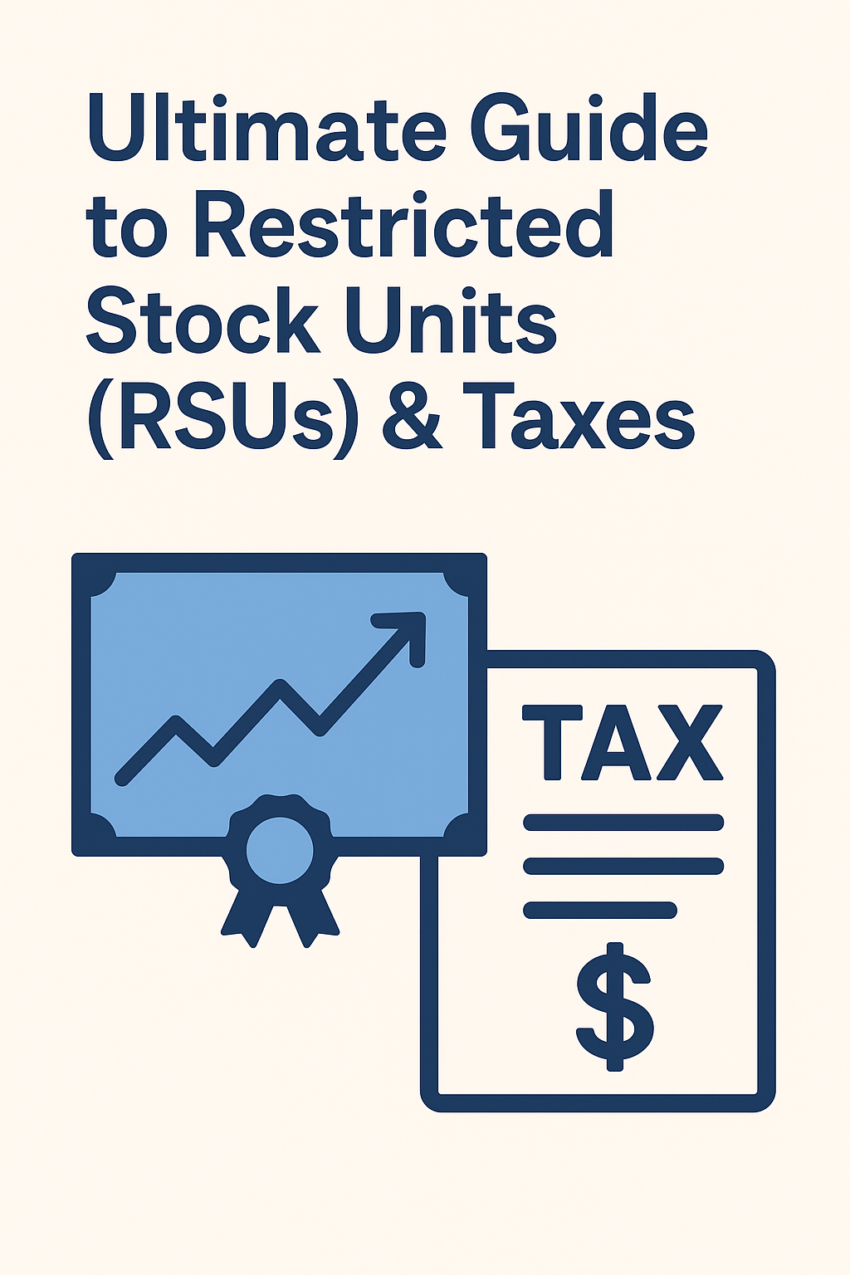In today’s fast-moving job market, tech giants, startups, and even established corporations are offering more than just a paycheck—they’re offering equity compensation. And one of the most common equity perks employees receive is the Restricted Stock Unit (RSU).
If you’ve been granted RSUs—or are evaluating a job offer that includes them—understanding how they work can make the difference between building real wealth and facing an unexpected tax bill.
This guide breaks it all down: vesting schedules, tax rules, planning strategies, and special exceptions you need to know.
What Are RSUs, Really?
At their core, Restricted Stock Units (RSUs) are a promise from your employer: “Stay with us, help us grow, and you’ll own a piece of this company.”
But you don’t get the shares right away. RSUs come with restrictions—usually tied to time or performance. Once those restrictions lift (a process called vesting), you officially own the shares. That’s also when the IRS steps in.
Example:
If you’re granted 1,000 RSUs at $50 per share, you have the potential for $50,000 in equity. But if they vest over 4 years at 25% per year, you’ll receive 250 shares each year—assuming you remain with the company.
How Do RSUs Vest?
RSUs don’t fully belong to you until they vest. Companies use different vesting schedules, but they generally fall into these categories:
1. Time-Based Vesting
You earn shares based on how long you remain employed (e.g., monthly or annual vesting).
2. Performance or Milestone-Based Vesting
Your shares vest once you or the company hit specific goals, such as a revenue target, IPO, or project completion.
3. Double-Trigger Vesting
Common in private companies, this requires two conditions:
- You meet a service requirement (e.g., stay 4 years).
- A liquidity event occurs (IPO or acquisition).
Important: Some agreements include a “must be present to win” clause—if you leave before the IPO or buyout, you lose the RSUs, even if you’ve met the time-based requirement. Always review your plan details carefully.
When Do RSUs Become Taxable?
Understanding RSU taxes is crucial for smart financial planning.
- At Grant: No tax—you don’t own anything yet.
- At Vesting: Taxable. The value of vested shares is treated as ordinary income and reported on your W-2.
Example:
If 1,000 shares vest at $50 each, you recognize $50,000 in income.
Tax Withholding Rules:
- 22% federal withholding (up to $1M in supplemental income)
- 37% withholding on amounts above $1M
- Plus: Social Security, Medicare, and state taxes
Many employers use a sell-to-cover strategy, automatically selling enough shares to cover your tax bill.
RSUs After Vesting: Capital Gains
Once vested, RSUs convert into regular shares. From then on, taxes depend on when you sell.
- Sell Immediately: No capital gain—you’ve already paid income tax.
- Hold > 1 Year: Any appreciation above the vesting price is taxed at long-term capital gains rates (15%–20%).
Example:
- 1,000 shares vest at $50 → $50,000 income (W-2)
- You hold 1 year and sell at $60 → $10,000 capital gain
- Gain taxed at lower long-term capital gains rate
What Happens If You Leave the Company?
- Vested RSUs: Yours to keep.
- Unvested RSUs: Typically forfeited.
- Private Company RSUs (Double-Trigger): If no IPO or acquisition occurs while you’re employed, you may lose them entirely.
Some companies allow you to retain vested-but-unsettled RSUs, while others don’t. Always check your plan documents.
Smart Tax Planning Strategies for RSUs
RSUs can significantly boost your wealth—but they also increase your tax liability. Here are proven strategies:
- Maximize Pre-Tax Contributions – Contribute to 401(k), HSA, and FSA to reduce taxable income (potentially by ~$55k).
- Withholding Management – Adjust W-4 or make estimated tax payments to prevent underpayment penalties.
- Charitable Giving – Donate RSUs directly or use Donor-Advised Funds (DAFs) to claim deductions and avoid capital gains.
- State Tax Optimization – If possible, time vesting while living in a no-tax state (TX, FL, NV).
- Tax-Loss Harvesting – Offset RSU gains by selling underperforming investments.
- Bunch Deductions – Group deductions into high-income years to reduce taxable RSU income.
- Sell at Vest – Eliminates market risk and avoids short-term gains.
- Hold for Long-Term – Benefit from lower capital gains rates.
- Nonqualified Deferred Compensation (NQDC) Plans – Defer RSU income to future years (subject to employer risk).
Real-World Example: Rohit’s RSUs
Rohit, a mid-level manager at a fintech firm, receives 2,000 RSUs vesting over 4 years.
- Year 1: 500 shares vest at $40 = $20,000 W-2 income
- Company withholds 22% federal + payroll taxes
- Rohit holds shares for 14 months and sells at $60 = $10,000 capital gain
- Capital gain taxed at 15% = $1,500
By holding long-term, Rohit avoided higher short-term tax rates and secured lower capital gains treatment.
Final Thoughts: RSUs Are More Than Just a Bonus
RSUs aren’t just “extra money”—they can be one of the most valuable parts of your compensation package. But with value comes complexity. Taxes, vesting rules, and company policies can all make or break your financial outcome.
The key is knowing when you’ll be taxed, how much you’ll owe, and whether to sell or hold.
Need Help Navigating RSUs?
At SR FinTax Advisors, we specialize in helping professionals:
- Plan RSU taxes proactively
- Avoid costly surprises at tax time
- Strategically time RSU sales for maximum after-tax wealth
Book your personalized RSU tax consultation today with SR FinTax Advisors—and let’s make your equity compensation work smarter for you.
